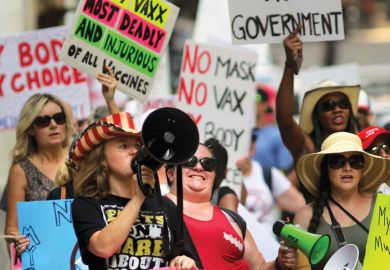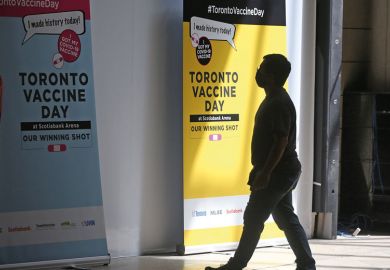Browse the results of the Wall Street Journal/Times Higher Education College Rankings 2022
Most international students who are considering studying in the US would be more likely to apply to a university if it mandated a Covid-19 vaccine passport, according to a study conducted by Times Higher Education.
In the survey, completed by 440 current and prospective international students, 44 per cent of respondents said that they would be much more likely to apply to an institution if a Covid-19 vaccine passport was compulsory for entry, and 15 per cent said that they would be somewhat more likely to do so. Just 11 per cent of respondents said that they would be much less or somewhat less likely to apply for a university with that condition.
Just over half (57 per cent) of respondents said that they had received a Covid-19 vaccine, while 88 per cent of those who have not been inoculated said they would accept the vaccine if offered.
The survey was conducted in September by THE’s consultancy team, ahead of the launch of the Wall Street Journal/THE College Rankings 2022. All respondents had expressed an interest in studying in the US, but the majority were also considering applying to universities in other countries – mainly the UK and Canada.
Hundreds of US universities have made vaccination compulsory if students want to return to campus this autumn, while the Biden administration is holding out the possibility of forcing vaccine and mask mandates on US college campuses. In contrast, the Westminster government has said that it has no plans to require students in English universities to get vaccinated against Covid-19 if they want to attend lectures or live in halls of residence.
The THE study also found that the majority of prospective international students want to study in-person and are willing to quarantine to do so. The vast majority (86 per cent) of respondents said that they would feel positive or very positive if one of their first-choice universities announced that all its teaching would be in-person, compared with 27 per cent for online-only teaching and 64 per cent for a mixture of online and in-person teaching.
Similarly, 84 per cent of students said that they would be willing to quarantine upon arrival in the US in order to study face-to-face there. Just 40 per cent said that online learning with a US university would be a worthwhile experience, while only 34 per cent said it would be better than studying face-to-face in their home country (versus 42 per cent who disagreed with this statement).
However, overall the survey suggests that prospective international students are far more concerned about financial matters than the medium of instruction. When respondents were asked for the three most important factors that help inform them where to study, most cited tuition cost (52 per cent), followed by teaching quality (34 per cent) and university rankings (31 per cent). The quality of digital offerings and ICT provision was deemed the least important out of 14 factors, cited by just 3 per cent of students.
When asked for their three main motivations behind looking to study in the US, the highest share (41 per cent) cited availability of scholarship or funding opportunities, and when asked for their three biggest concerns regarding studying in the US, the highest share (56 per cent) said cost of tuition.
Register to continue
Why register?
- Registration is free and only takes a moment
- Once registered, you can read 3 articles a month
- Sign up for our newsletter
Subscribe
Or subscribe for unlimited access to:
- Unlimited access to news, views, insights & reviews
- Digital editions
- Digital access to THE’s university and college rankings analysis
Already registered or a current subscriber?








